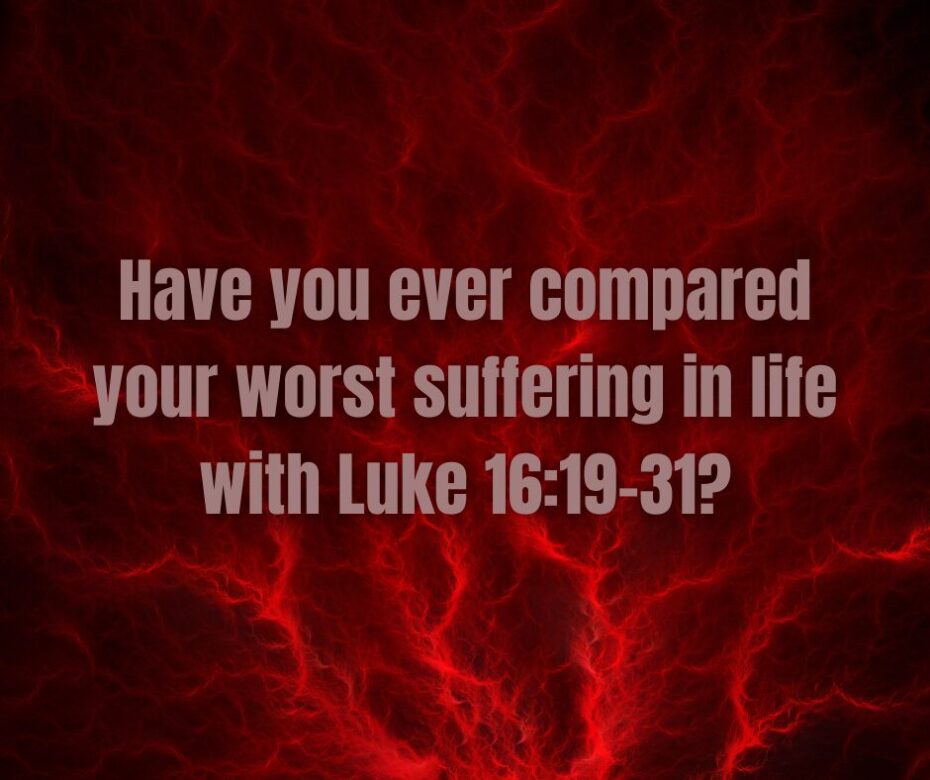The Bible says very little about what we call hell. That has resulted in lots of misconceptions. In this blog, we will focus on a massive misconception: The eternal experience of unbelievers will be intolerable torment, worse than any torment in this life.
Pastor, author, and theologian John Piper wrote: “I know of no one who has overstated the terrors of hell.”i
An unnamed author at netbiblestudy.com is even more insistent on the surpassing horror of hell:
If one could take all the anguish of those who have ever been in a hospital…all the screams of those who have died on the battlefields of the world…all the tears of those who have ever been in a penitentiary…all the unspeakable agony of those who have ever been ravaged by disease…and all the mental torment of those who have ever been in an insane asylum…and combine…and experience…them all in one inferno of human misery…one could still not produce…and experience…the degree…and depth…of pain of those doomed to dwell in eternal hell, chained to stakes of eternal torments.ii
Internationally known British evangelist John Blanchard similarly writes:
“If all the pains, sorrows, miseries and calamities that have been inflicted upon the sons of men…should meet together and centre in one man they would not so much as amount to one of the least of the pains of hell.” Those words by Thomas Brooks remain as true today as when they were originally written, nearly 400 years ago.iii
I don’t agree.
You may think I disagree because I don’t want people to suffer like that. While I don’t, I would teach that if God’s Word taught it. But it does not.
I disagree because the Bible presents a different picture.
In Luke 16:19-31 the Lord speaks of a rich man in the bad part of Hades and Lazarus and Abraham in the good part. The rich man is in torment. Beyond that, we are not told about his suffering.
The rich man carries on a fairly involved conversation with Abraham. I’ve had level 9 and 10 pain with massive headaches and kidney stones. I wasn’t carrying on any conversations. The bottom line is that while this text gives us some ideas about what Hades is like, it doesn’t tell us much.
Have you ever compared your worst suffering in life with Luke 16:19-31?
In Isa 14:9-11 the king of Babylon dies and goes down to Sheol.
Motyer’s comments are helpful here:
In verses 9-15, Isaiah takes us on an imaginative trip to Sheol, the abode of the dead. We hear how Sheol reacts to the arrival of the king (9-10), and what a contrast this is (11-15) to his ambitions and self-estimation. Imaginative though this is, great Old Testament truths are accurately expressed. First, the dead are alive. In the Bible ‘death’ is never ‘termination’ but always change of place (from earth to Sheol), change of state (from body-soul unity to the separate life of the soul) and continuity of person. Thus, in Sheol, there is personal recognition: the king is recognized as he arrives (10); the existing residents rise from their thrones—not because there are thrones in Sheol but because they are the same people as once they were on earth. But the dead are ‘shades/shadowy ones’ (9), weak (10) because death has sundered body and soul; the soul by itself is but a half-life. The Old Testament awaits the Lord Jesus to meet its implied need of the resurrection of the body. This is an illustration of the progressive, cumulative revelation which runs through the Bible.iv
If there is some measure of pleasure in mocking new arrivals in Sheol, it seems likely that people in the lake of fire will also mock each other for eternity. In any case, this picture of Sheol/Hades is less intolerable than most suggest.
Revelation 14:11 adds one detail. The torment will go on forever. It may or may not fluctuate over time. Maybe the pain will rise and fall throughout the day. Or maybe it will be constant. But it will be forever.
Two extremes occur today and must be avoided.
Extreme one: The torment in hell now and the lake of fire later will be intolerable and worse than any torment in this life.
Extreme two: There will be no torment at all because either God will annihilate unbelievers, everyone will be saved (universalism—including the idea that those who never heard a clear saving message are born again the moment they die), or any “torment” will be unconscious.
When speaking of Jewish cities that would reject the preaching of the disciples, Jesus said, “Assuredly, I say to you, it will be more tolerable for the land of Sodom and Gomorrah in the day of judgment than for that city!” (Matt 10:15). See also Matt 11:22, 24. Those verses show that the degree of torment in the lake of fire will be worse for some than for others. All will be tormented. But it will be more tolerable for some.
The fact that the Lord spoke of their torment being more tolerable suggests that it cannot be worse than anything in this life. Many pains in this life are intolerable.
We know the lake of fire will be a place of unending torment. The torment will be more tolerable for some than for others. But it will be tolerable torment. We have only a vague picture of what Sheol/Hades is like now. We have no picture of what the lake of fire will be like.
It’s time we stop going beyond Scripture. Let’s not say that the torments in the lake of fire will be worse than anything in life.
__________
i See https://www.desiringgod.org/messages/the-echo-and-insufficiency-of-hell-part-1.
ii See http://www.netbiblestudy.com/00_cartimages/whatcouldbeworsethanfiresofhell.pdf.
iii Blanchard, Whatever Happened to Hell? (Durham, England: Evangelical Press, 1993), p. 143.
iv J. Alec Motyer, Isaiah: An Introduction and Commentary, Tyndale Series (Downers Grove, IL: Inter-Varsity Press, 1999), p. 119.


